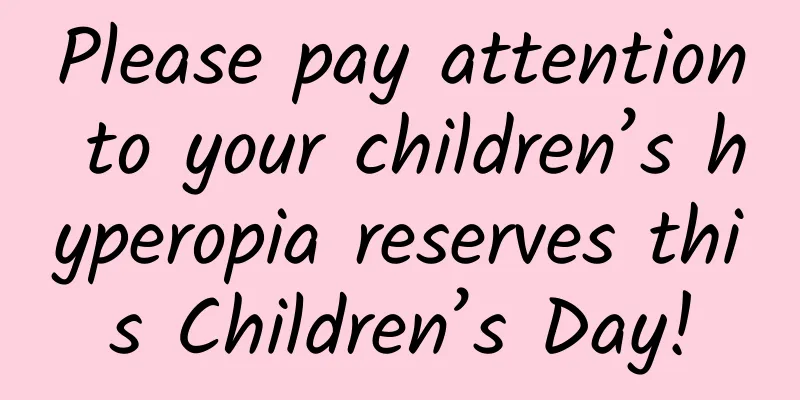Please pay attention to your children’s hyperopia reserves this Children’s Day!

|
What is hyperopic reserve? Hyperopia reserve refers to the refractive state of adolescent children at the corresponding age, which is the result of dynamic matching between axial length and parameters such as corneal and lens refractive power. Generally speaking, the eyeballs of newborns are not fully developed and the eye axes are short. At this time, both eyes are in a hyperopic state with an average refractive power of +2.50⁓+3.00 D. This physiological hyperopia is called hyperopic reserve. As children and adolescents’ eyes develop, their eye axes lengthen and their hyperopia gradually decreases. Generally, they develop into emmetropia (with a refractive power between -0.50 and +0.50 D) by the age of 15. This process is called emmetropization. [1] If the eye axis continues to grow without being controlled after reaching emmetropia, it will develop into myopia. Image source: Courseware from the National Comprehensive Prevention and Control of Myopia among Children and Adolescents Lecture Group of the Ministry of Education of the People’s Republic of China Relationship between hyperopia reserve and myopia Each age group has a corresponding amount of hyperopia reserve, and the hyperopia reserve of adolescents in different age groups is different. Due to excessive and early use of the eyes at close range, some children and adolescents have used up their hyperopia reserves before the age of 6, and are very likely to develop myopia in primary school. If the hyperopia reserve is used up too late, amblyopia and strabismus may occur, causing abnormal visual function of the eyes. Therefore, the possibility of children and adolescents developing myopia can be determined by examining changes in their hyperopia reserve, and a myopia risk assessment can be made. Image source: Courseware from the National Comprehensive Prevention and Control of Myopia among Children and Adolescents Lecture Group of the Ministry of Education of the People’s Republic of China Pay attention to your child’s hyperopia reserve Early screening to establish vision records Eye screening at birth First eye exam at age 3 Regular check-ups twice a year during childhood and adolescence Determine indicators such as visual acuity, refractive status, axial length, eye position, anterior segment and fundus health examination, and parents' refractive status. The earlier myopia occurs, the worse the myopia control effect! The more likely it is to develop high myopia! Learn about myopia prevention and control knowledge Spend more than 2 hours of outdoor activities every day Reduce the time of using eyes at close range Maintain a reasonable sitting posture and eye distance Adjust for good lighting Content source: [1] Expert consensus on hyperopia reserve, axial length, corneal curvature reference range and genetic factors in Chinese school-age children (2022) Medical knowledge is for reference only and is not used as a basis for diagnosis |
<<: National Eye Care Day丨Tips on how to protect your eyes
Recommend
Heart and brain connected, different diseases treated with the same method
Author: Liu Xiaolu, deputy chief physician, Pekin...
What are the benefits of sparkling water? Is sparkling water acidic or alkaline?
Sparkling water is a beverage with a refreshing t...
The dangers of scratching your belly during pregnancy
It is not recommended for pregnant women to scrat...
37 weeks of pregnancy, strong and powerful fetal movement
At 37 weeks of pregnancy, the fetus is already fu...
A Meat Eating Guide for Dialysis Patients: The Correct Way to Eat
Many dialysis patients have this question: Can I ...
Being "cut off" when traveling abroad? Doctors speak out...
"Kidney transplantation has extremely strict...
51 days pregnant, pregnancy test stick can not detect
With the emergence of many pregnancy test product...
How to delay menstruation easily
Every woman's menstruation is relatively regu...
Why does lochia occur after abortion?
Nowadays, due to many reasons, such as work press...
How to treat constipation and irregular menstruation?
There are many factors that cause irregular menst...
Is it normal to fart when pregnant?
Farting is a very normal thing in daily life, so ...
How to solve the problem of milk blockage caused by hard soil
The first thing a woman has to face after giving ...
How long does it take after menopause for the uterus to start shrinking?
When women enter the aging stage, menstruation wi...









